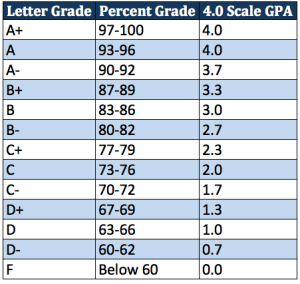I often get the question, “How many credit hours should I take my first semester of college?”
Of course, the specific answer depends on the individual and their situation. But, there are many different general opinions to this question.
Today, I’m going to pick on one group’s answer. This camp tells freshmen to get ahead by taking 18 credit hours, or more, in their first semester.
This group firmly believes a college student needs to hedge against the possibility of graduating late more than anything else.
I understand the argument there. And when it’s doable to graduate in four years, I agree that graduating in five or six years is a waste of time and money.
But with those acknowledgements, I disagree in starting college with a heavy class schedule to get ahead. I believe this may actually put the student behind.
College students will help themselves if they take no more than 15 credit hours in their first semester. Let me explain why.
Building Good Habits
When transitioning from high school life to college life, time-management is critical to success. Effective time-management sets a positive balance among classes, friends, extracurriculars, and health (sanity, gym time, and sleep).
Essentially, how well a college student manages time can be an accurate test of their overall happiness. It’s that important!
But, with 18 credit hours in the first semester, this demanding class schedule can set a negative foundation that leaves lasting effects.
For example, heavy school responsibilities can add to the feelings of being overwhelmed by a new environment. To cope with this, many times students use procrastination as their only answer. Then procrastination slowly develops into a regular bad habit up to graduation.
Or, these students put in significant time to do well in their 18-credit hour schedule. But, they often do so by sacrificing the time needed to get acclimated to living on their own, building good habits, and making new friends.
In contrast, at 15 credit hours, there is naturally less school work involved. Procrastination will be less desirable when a college student isn’t overwhelmed with stress.
Their lighter schedule also means there’s more time to find their way around college, socialize, understand Greek life, work out, and sleep.
With less classes on their plate, students feel more comfortable getting situated and usually find a better balance in college.
Build Smart Study Habits
As already discussed in the blog post College Students Have It Wrong, getting off to a fast start academically is critical. And a smaller class schedule gives college students a better opportunity to achieve a higher GPA.
This is true, because the general rule is each hour you spend in class will require two to three hours of studying each week. In other words, more classes means more homework and less time.
From a distance there doesn’t seem to be a drastic difference between the student who takes 18 hours and the one who takes 15. But, when you run the numbers using the general rule above, the student with 18 credit hours already has 5 to 7.5 more hours of homework each week.
These 5 to 7.5 extra hours take away time from other classes, which makes it harder to perform in school with peers who take less credits. And, if you’re in over your head in school work, you won’t have time to experiment with where you study best, when you study best, and other productivity strategies.
Effective study habits, discipline, and time-management aren’t established from scratch. It’s a learning process to refine over time.
So, I believe the magic range for college students in their first semester is 12 to 15 credit hours. This way you don’t bite off more than you can chew, and get stuck in a hole.
For those of you who say taking less credits will put you behind pace and potentially cause you to graduate late, let me ease your worries with the next section.
Solutions To Make Up Credits
With the options below, it should be fairly easy to gain extra credit hours. Sometimes students do one of the following and get enough credits that they can take a lighter semester senior year.
1. Summer school. Summer classes offer easy accessibility (whether at a different college or online), while giving you extra credit hours toward graduation. But, be sure to verify your college will accept transfer credits from the other school.
If you need a class because it’s a prerequisite for another, summer is a great time to take the required class.
If calculus at your college is insanely difficult, many students take it during the summer at an easier community college. If you’re going to intern during school and need a lighter schedule, summer classes can help.
2. Internships that count as college credit. To remain in legal grounds, organizations are moving away from unpaid internships and moving toward compensating interns with college credit.
With the rise of college tuition, doing an internship for credit hours isn’t a bad bargain when it also helps you graduate on time.
3. Summer study abroad. If you go abroad during the summer, your program will likely award anywhere from 6 to 12 credit hours, depending on the time overseas.
Sometimes you get credits for simply touring the beautiful city of your abroad location, and that’s the best deal.
4. Winter term. As colleges look to increase revenue streams, winter courses are becoming more popular. You can take advantage of this, just like summer classes, and you can also study abroad in this time.
So, start with around 12 to 15 credit hours in your first semester. You won’t regret it!
Want more extremely valuable college advice? Click here to order my Amazon bestselling book How To College!
Readers, do you agree or disagree with this advice to take less credit hours when starting college?







I recommend 12 for every semester. If you have 8 * 3 = 24 transfer credits from high school or community college then you will have 120 hours at the end of senior year. So if your in high school you can get around 8 ap/ib credits junior or senior year. Or maybe you can take community college classes for free while in high school.
If you don’t have 24 transfer credits then see if you can take community college classes over the summer. Try to plan for a college that will be a good fit and has greater than 50% acceptance rate early. This is so you can get 8 classes that will actually give you credit. If you are going to be a science major, AP Calculus BC and AP Physics are really good. You could also take AP Chemistry but I believe it is the hardest AP. Also AP Computer Science is useful for many.
Any major should take 3 or 4 of AP European, AP US History, AP Psychology, AP World History, and AP Human Geography.
If not a science major go for AP Environmental Science, AP Biology, AP statistics.
If your college requires language take the highest level in high school, level 4 or AP, otherwise just take level 1 and 2.
I took AP Calculus BC, AP Physics 1, AP Computer Science, AP Chemistry, AP Biology, AP Psychology. This got me to 24 credit hours but I wish I would have had the AP Histories.
I had 5 classes first semester of college and twice in high school and it was not a good experience. Never take 5 core classes, always 4.
Also if your high school doesn’t offer AP you can take them online. That is what I did for all but AP Psychology. Tell your counselor.
Taking 12 credit hours is not lazy. It is smart. You will have more free time, more time to study, and better grades. Also it much easier to think about 4 classes than 5.
I totally agree that if high school students have the wisdom to plan ahead (which many of them don’t) to get 24 transferable credits, then their college life will be so much easier. Your other insights are spot on and I hope my readers take your advice, Calvin.